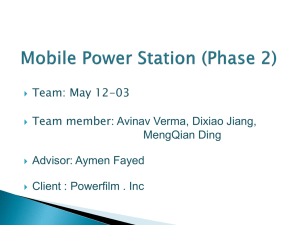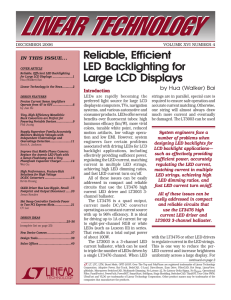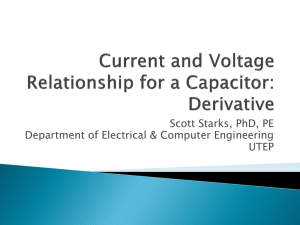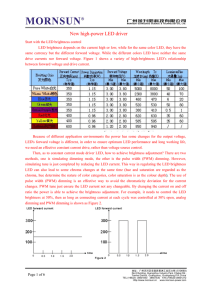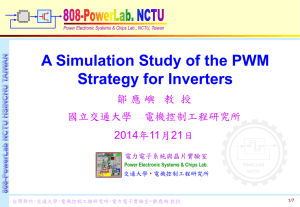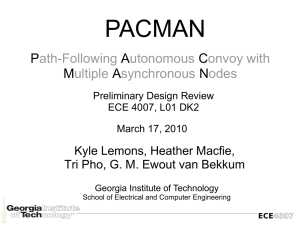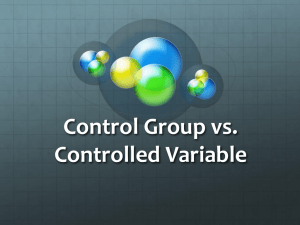IRS2980 Press Presentation
advertisement
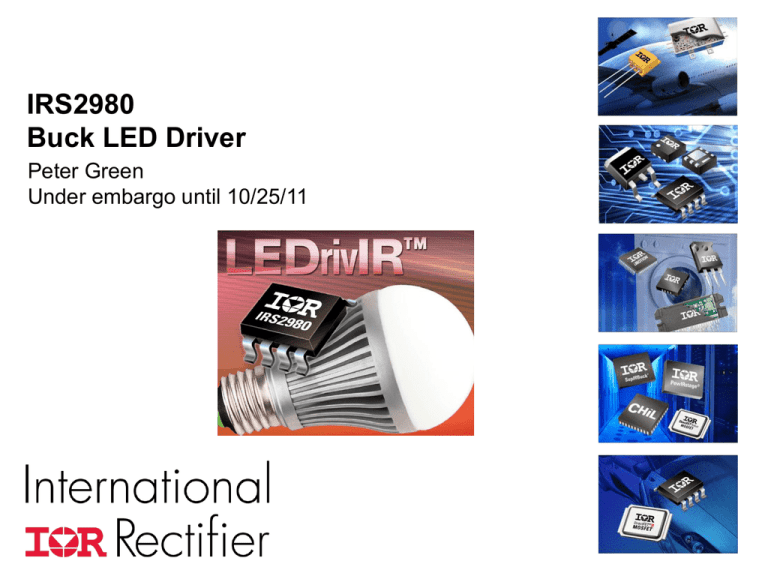
IRS2980 Buck LED Driver Peter Green Under embargo until 10/25/11 1 Target Applications and Markets • Non-isolated LED drivers where input voltage > output voltage • LED light bulb replacements (non-dimmable) • LED tube replacements • LED street lighting • LED office light fixtures • LED refrigerator lighting • LED runway lighting • Solar LED street light • Gaming machines Existing Solutions • Passive LED driver circuits • Use diodes, resistors and capacitors only • LED current is limited (many small LEDs) • Cheap but poor performance and reliability • Low-voltage Buck LED drivers • Peak current regulated Buck LED drivers Passive LED Driver • Minimum cost solution • No current regulation • LED current varies with line voltage • LED current varies with temperature • Low power factor / high harmonics • Standard white LEDs not HBLEDs • If one LED fails open circuit the product no longer operates • Cannot comply with Energy Star 1MOhm LEDs 22uF 1uF x 3 15Ohm Peak Current Buck Regulator • Fixed frequency oscillator DC B US 2 • Buck regulator with low-side • Can be unstable above 50% VDD duty cycle VIN 1 switch LED RT PWM_D • Vin > 2 x Vout G ND LD GA TE CS • Ripple must be small so that Iav is close to Ipk • Inductor needs to be large enough to maintain small ripple current Iout Iout_peak Ioutavg Accuracy vs inductor size tradeoff FixedFrequency IR Solution IRS2980: • Available in SO8 package • High-voltage Buck continuous mode LED driver (up to 375V continuous) • Floating differential current sense • Accurate constant current control (average current control) • Internal HV regulator (no separate VCC supply needed) • On board PWM dimming oscillator (not triac dimmable without additional • • circuitry) Frequency limiter (150kHz prevents internal regulator overheating and limits switching losses in the MOSFET and diode) May be used with passive valley fill PFC to obtain PF > 0.7 Trademark and logo for IR new LED driver family: IRS2980 LED Driver RCS VBUS DBUCK HV CVF CBUS ADIM COM IRS2980 1 VS 2 VCC 3 CVCC COM 4 8 IRS2980 • Free running frequency • Buck regulator with low-side switch • High-side current sensing • Average current hysteretic control • Stable over full operating range • Higher ripple can be tolerated without • excessive loss in accuracy • PWM Dimming with analog control • Inductor needs to be large enough to • limit ripple current • Accuracy vs inductor size tradeoff 7 LBUCK CS OUT RG MBUCK RAMP 6 5 ADIM CRAMP How Does the Product Work? • Contains HV regulator for IC supply • Uses Gen 5 HVIC technology • Floating differential current sense for LED current sensing • Hysteretic current regulation • Free running operation (no Buck oscillator, no fixed frequency) • Maximum frequency limiter (150kHz) • Efficiency is best at high duty cycle where Vout is close to Vin • Low-side MOSFET gate drive • PWM dimming from external DC control voltage (0 to 2V) Iout Iout_peak Iout avg Low Cost IRS2980 LED Driver RCS DBUCK CBUS1 DB1 DB2 D1 LIN HV 1 VS CIN D2 2 VCC 3 CVCC COM DB4 D3 4 8 IRS2980 CVF DB3 RF CF 7 LBUCK CS OUT RG MBUCK RAMP 6 5 ADIM CRAMP CBUS2 • Low cost passive “Valley fill” PFC can be used in off line Buck regulators. • Provides power factor ~0.9. • It is constrained by ripple on DC bus being regulated out to provide a constant output current. Product Literature/Support Literature • Datasheet IRS2980 • Application Note AN-1171 relates to reference design IRPLLED7 IRS2980 •SPECIFICATIONS • Input Voltage 70V to 240V (AC) • Output Voltage 0V to 50V (DC) • Regulated Output Current: 350mA • Power Factor ~ 0.9 • Dimmable by on board potentiometer - 0 to 100% • Non-isolated Buck regulator Typical Results (IRPLLED7 Demo Board) Input = 60VDC Output = 20V / 350mA Efficiency = 80.2% Green Trace = Gate Drive Blue Trace = Output Current Input = 180VDC Output = 20V / 350mA Efficiency = 75.3% PWM Dimming Option RCS DBUCK RF CF DB1 DB2 HV LIN 1 VS CIN 2 VCC 3 CVCC COM DB3 DB4 4 IRS2980 CVF CBUS 8 7 LBUCK CS OUT RG MBUCK RAMP 6 5 ADIM RDIM RVDIM • 0 to 2VDC analog control on ADIM input • Adjusts PWM duty cycle for dimming (0 to 100%) • CRAMP determines the PWM frequency • PWM direct input is possible through ADIM (replace CRAMP with resistor to set threshold) CRAMP PWM Dimming Duty Cycle (%) Percentage of Light Output Analog or Digital dimming signal is applied to the DIM input ADIM voltage relationship to light output 100 90 80 70 60 50 40 30 20 10 0 0 0.2 0.4 0.6 0.8 1.0 1.2 ADIM pin voltage 1.4 1.6 1.8 2.0 IRS2980 IC Summary • For LED driver applications (typically < 50W) • For off line AC input voltage range 90 to 265VAC • Internal High Voltage Regulator • Power Factor > 0.9 with passive valley fill input stage • Continuous Conduction Mode (CCM) Buck Regulator • Typical Efficiency >80% (depending on line and load) • Suitable for non-isolated LED drivers • Protected against output short circuit • Regulated output current for LED driving • Hysteretic Average Current Control (for accurate regulation) • PWM dimming input, controlled by analog or PWM input
